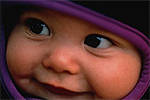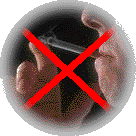 | Too Hot! Does Overheating Contribute to Sudden Infant Death Syndrome (SIDS)? |
 | Too Hot! Does Overheating Contribute to Sudden Infant Death Syndrome (SIDS)? |
April 17, 2001
Sudden Infant Death SyndromeMost parents think they are doing the right thing when they dress their baby in warm pajamas, place him in a crib with blankets and turn up the heat in his bedroom. Researchers at the University of Washington in Seattle think that such actions may be the wrong thing. They believe that making the baby too warm will increase the risk of Sudden Infant Death Syndrome (SIDS).Sudden Infant Death Syndrome (SIDS) is many new parents' greatest fear. An infant is put to bed for the night and for some unknown reason, the baby stops breathing and dies. No one knows for sure what causes SIDS. One theory is that a baby sleeping on his stomach (prone sleeping) rebreathes a dangerous amount of carbon dioxide. During the night, carbon dioxide levels rise to deadly levels. This could happen because infants do not turn over or move much when they sleep, so they are inhaling and exhaling into the same small area where carbon dioxide does not move away. Drs. Warren G. Guntheroth and Philip S. Spiers of the Department of Pediatrics at the University of Washington reviewed the literature on SIDS and concluded that overheating is a major risk factor in SIDS. They pointed out that several ways that babies can get too hot ("heat stress"):
Infection Minor illnesses, such as colds, have been associated with the increased
risk of SIDS. Babies sometimes have fevers when they are sick and parents
often dress their sick babies in warmer clothes.
Minor illnesses, such as colds, have been associated with the increased
risk of SIDS. Babies sometimes have fevers when they are sick and parents
often dress their sick babies in warmer clothes.
Warm EnvironmentResearch has shown that SIDS is less common in the summer. However, during the summer, babies are usually dressed in light clothes and are allowed to sweat. Sweating is a good way to keep cool. In the winter, parents may turn up the room heat and dress their babies warmly. This may raise the baby's temperature.Too Many BedclothesIn the winter, babies are often dressed in heavy bedclothes. If wool or down blankets are added on top of the baby, the baby may get too warm. Additionally, infants may not be able move blankets off if they get too warm.Head Coverings For babies as well as adults, most heat is lost through the face and head.
If a baby's face and head are covered by pajama hoods or blankets, then
body temperature will rise.
For babies as well as adults, most heat is lost through the face and head.
If a baby's face and head are covered by pajama hoods or blankets, then
body temperature will rise.
Soft BeddingSoft bedding puts more of a baby's body in contact with the bed. Therefore, there will be less body surface area to get rid of heat.Prone Sleeping (Sleeping on Stomach)Prone sleeping is the greatest known risk factor for SIDS: babies who sleep on their stomachs are more likely to suffer SIDS. As with soft bedding, prone sleeping puts more of the baby's body in contact with the bed. Sleeping this way also puts the baby's face in contact with the bed, further reducing heat loss through the head.Bed SharingHeat from other people in the same bed may contribute to higher body temperatures. Drs. Guntheroth and Spiers also point out that babies who sleep with their mothers often have their heads covered by blankets.Passive Smoking Most heat is lost from blood vessels through the skin. Nicotine
constricts peripheral blood vessels and therefore can reduce heat loss.
Studies have shown that babies born to parents who smoke have a greater
risk of SIDS.
Most heat is lost from blood vessels through the skin. Nicotine
constricts peripheral blood vessels and therefore can reduce heat loss.
Studies have shown that babies born to parents who smoke have a greater
risk of SIDS. Each of these factors may raise an infant's body temperature to levels that interfere with the brain's ability to control temperature and breathing. It may be that heat stress and rebreathing of exhaled carbon dioxide BOTH contribute to SIDS. Drs. Guntheroth and Spiers suggest that to reduce the risk of SIDS:
|
| References and further reading: |
| BACK TO: | Neuroscience In The News | Table of Contents |
![[email]](./gif/menue.gif) Send E-mail | ![[survey]](./gif/menusur.gif) Fill out survey | ![[newsletter]](./gif/menunew.gif) Get Newsletter | ![[search]](./gif/menusea.gif) Search Pages |